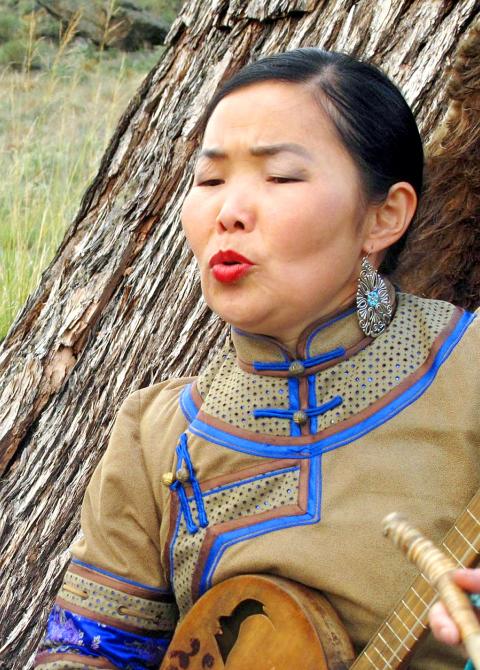The tiny Russian republic of Tuva, located in Siberia just north of Mongolia, will be the focus at Taipei’s Red Room this weekend. The three-day event kicks into high gear tonight with a concert featuring Tuva’s trademark throat singing along with both local and foreign talent.
The visiting throat singer — who can produce two or more tones simultaneously — is Choduraa Tumat, founder of an all-female folk ensemble who also plays the Jew’s harp and horse-head fiddle. She will share the stage with Atayal Aboriginal singer and dancer Pisui Ciyo, Paiwan Aboriginal double nose flute player Sauniaw, Mexican percussionist Ivan Alberto and Dutch performance artist and Siberian music expert Mark van Tongeren.
Tomorrow’s program, “A Touch of Tuva,” will focus on culture as Choduraa Tumat and others will be introducing the music, film, food, drink and even smells of the Tuvan grasslands and taiga. And finally, those who want to try throat singing can participate in workshops on Sunday.

Photo courtesy of Red Room
■ Tonight’s concert is from 7:30pm to 9:30pm at the Red Room, Taiwan Air Force Innovation Base (TAF 空總創新基地), 177, Sec 1, Jianguo S Rd, Taipei City (台北市建國南路一段177號). Tomorrow’s event is from 2pm to 6pm, also at the Red Room. The workshops are 10am to 1pm for beginners and 2pm to 5pm for advanced students at the Canjune Training Center, 4F, 3, Ln 151, Fuxing S Rd Sec 2, Taipei City (台北市復興南路151巷3號4樓)
■ Admission is NT$600 for tonight’s concert, tomorrow’s program is free. The workshops are NT$2,500 for each half day. Registration is required. Visit www.fusica.nl/a-touch-of-tuva-in-taipei for more details in both English and Chinese.

Most heroes are remembered for the battles they fought. Taiwan’s Black Bat Squadron is remembered for flying into Chinese airspace 838 times between 1953 and 1967, and for the 148 men whose sacrifice bought the intelligence that kept Taiwan secure. Two-thirds of the squadron died carrying out missions most people wouldn’t learn about for another 40 years. The squadron lost 15 aircraft and 148 crew members over those 14 years, making it the deadliest unit in Taiwan’s military history by casualty rate. They flew at night, often at low altitudes, straight into some of the most heavily defended airspace in Asia.

Many people in Taiwan first learned about universal basic income (UBI) — the idea that the government should provide regular, no-strings-attached payments to each citizen — in 2019. While seeking the Democratic nomination for the 2020 US presidential election, Andrew Yang, a politician of Taiwanese descent, said that, if elected, he’d institute a UBI of US$1,000 per month to “get the economic boot off of people’s throats, allowing them to lift their heads up, breathe, and get excited for the future.” His campaign petered out, but the concept of UBI hasn’t gone away. Throughout the industrialized world, there are fears that

Like much in the world today, theater has experienced major disruptions over the six years since COVID-19. The pandemic, the war in Ukraine and social media have created a new normal of geopolitical and information uncertainty, and the performing arts are not immune to these effects. “Ten years ago people wanted to come to the theater to engage with important issues, but now the Internet allows them to engage with those issues powerfully and immediately,” said Faith Tan, programming director of the Esplanade in Singapore, speaking last week in Japan. “One reaction to unpredictability has been a renewed emphasis on

Taiwan’s democracy is at risk. Be very alarmed. This is not a drill. The current constitutional crisis progressed slowly, then suddenly. Political tensions, partisan hostility and emotions are all running high right when cool heads and calm negotiation are most needed. Oxford defines brinkmanship as: “The art or practice of pursuing a dangerous policy to the limits of safety before stopping, especially in politics.” It says the term comes from a quote from a 1956 Cold War interview with then-American Secretary of State John Foster Dulles, when he said: ‘The ability to get to the verge without getting into the war is